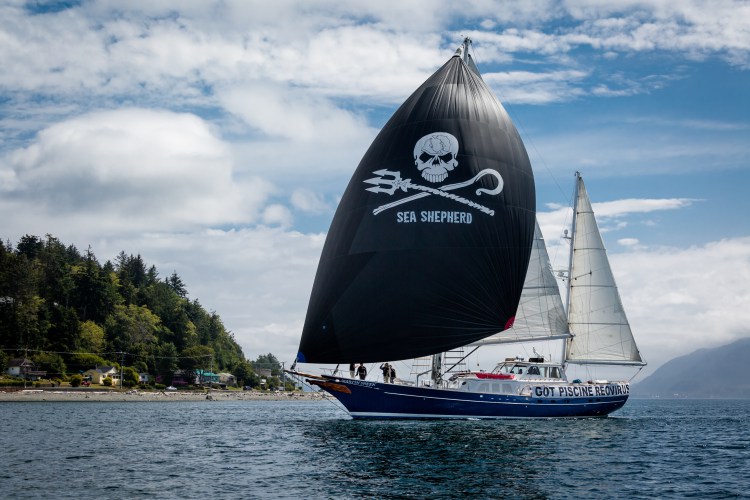Hope for Wild Salmon and Orca as the Noose Tightens on Salmon Farms
Published by Sea Shepherd Conservation Society
Sea Shepherd concludes third scientific expedition to investigate the possible link between salmon farms and declining wild salmon population in the Pacific. Meanwhile, lawsuit to stop transfer of infected fish continues.
Vancouver, BC, September 17th, 2018 – After three months of scientific investigation in the waters surrounding the open-net fish farms of British Columbia – and, for the first time, in Puget Sound, WA, Sea Shepherd’s Operation Virus Hunter has come to an end. This is the third year of the organization’s wild salmon defense campaign.
Working alongside a team of scientists including independent biologist Alexandra Morton, Sea Shepherd’s vessel The R/V Martin Sheen evaluated open-net pen salmon farms in the Broughton Archipelago, Discovery Islands, and Johnstone Strait regions of British Columbia, Canada. Following an invitation from Kurt Beardslee from Wild Fish Conservancy, the team also investigated farms in Puget Sound in the United States. In total the team investigated 39 farms. Sea Shepherd is supporting researchers as they investigate the relationship between open-net pen salmon farming, the transmission of viruses and bacteria into Pacific coastal waters, and the decline in wild salmon populations.
As with previous seasons, Sea Shepherd is working closely with First Nations who oppose the presence of foreign fish farms in their unceded territories. George Quocksister Jr., Hereditary Chief Gigame of the Laichkwiltach Nation, captured video footage inside the Barnes Bay farm this season. The footage shows farmed fish exhibiting symptoms of poor health. Finning, lethargic behavior, gasping for air, and lying stationary at the surface were common observations many farms.
When farm salmon exhibit poor health, the concern is that this becomes an unsafe infectious site to wild fish outside the pens. Wild salmon already face a challenging environment full of predators and the increasing impact of climate change. They are disappearing wherever there are salmon farms around the world. Hard data on the spread of viruses and bacteria from salmon farms on wild salmon is difficult and expensive work and by providing a ship and crew to scientists, this research has been advanced significantly.

The footage from inside the pens also captured images of wild species trapped inside the farms, including herring and other species that were documented eating farm waste, raising the concern that each farm is saturating the marine food-web with disease organisms. Chief Quocksister Jr. was physically blocked from entering additional farms by salmon farm employees as the industry tries to prevent images from in the pens becoming public.
There was a significant increase in aggressive surveillance of the research group this season. A company calling themselves Black Cube, which has the same name as the Israeli intelligence agency hired by Harvey Weinstein to discredit and intimidate victims of sexual abuse, was reportedly hired by salmon farming giant Marine Harvest to follow, film, and intimidate the researchers and crew aboard The R/V Martin Sheen. When questioned about the episode, Marine Harvest suggested that it was a different company doing surveillance that coincidently had the same name. Aluminum boats with blacked out windows followed the crew relentlessly, even when tied up in local towns.
Despite aggressive intimidation tactics, the campaign was successful and Alexandra Morton collected 53 tissue samples from waters adjacent to 23 of BC and Washington State’s open-net fish farms. These are unique samples, as they will help pin point the source of the infection. They will be tested for piscine orthoreovirus (PRV), a Norwegian virus believed to be associated with rupturing of the blood cells, a fatal condition in wild Chinook salmon. Preliminary lab results have tested positive for PRV in 100 percent of the samples analyzed to-date. Additional testing is underway.
Chinnok salmon are the primary food source of the endangered Southern Resident Orcas, whose plight of starvation into extinction has become known worldwide last month, when a mother carried a dead calf for 17 days. These orcas have not been able to produce a living calf in three years due to malnourishment.
“We are in a race against a virus from Norway as it spreads through the Eastern Pacific Ocean,” says Morton, “Virus Hunter III has advanced the research by giving me access to so many farms in such a short period of time over a large area. This work is critical to the orca that are starving to death on this coast, because the role of PRV in killing wild salmon has to be made clear to Canada and the U.S. as soon as possible.”
A 2015 court ruling, determined that the Minister of Fisheries and Oceans Canada (DFO) must screen farm salmon for PRV and prohibit the transfer of infected fish into the marine farms, but this policy has been ignored.
Alexandra Morton went back to court last week as well as the Namgis First Nation to stop PRV-infected farm salmon from entering BC waters. Justice Cecily Y. Strickland heard evidence from the lawyers of Ms. Morton, the ‘Namgis Nation, DFO, and representatives from Norwegian-owned salmon farm mega-corporations Cermaq and Marine Harvest.
The Virus Hunter campaign is building a powerful alliance between science, indigenous leadership, the law, and now international cooperation.
Read the full article at: https://seashepherd.org/2018/09/17/hope-for-wild-salmon-and-orca-as-the-noose-tightens-on-salmon-farms/









